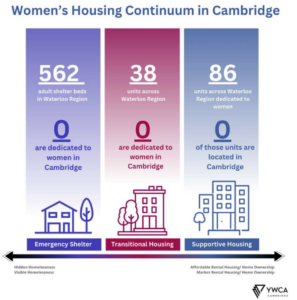Read: 4min
As part YWCA Canada’s ongoing series unpacking the gendered housing crisis, this blog post spotlights YWCA Cambridge’s report, “Women’s Homelessness in Cambridge: Knowledge Sharing & Interventions”
Homelessness is a pressing issue in many communities and has many short- and long-term impacts. This is particularly true in Cambridge (ON), where women’s experiences of homelessness are impacted by the city’s service desert and the total lack of dedicated emergency homeless shelter space for women. YWCA Cambridge’s report exposes the urgent need for collaborative action and comprehensive intervention strategies to support and understand the specific needs of women and gender diverse people experiencing homelessness in Cambridge.
Origin of this report
Roz Gunn, Director of Communications and Advocacy at YWCA Cambridge, noted the importance of highlighting homelessness and gender-based violence as interconnected issues, especially in communities like Cambridge where the services don’t fit the needs of the population.
For her, this report, the research and writing of which was led by YWCA Cambridge Manager of Advocacy, Jen Gordon, is the beginning of a broader conversation about what it means to build community and to make cities equitable: “We hope it’s just one contribution to the discourse around homelessness and it helps broaden peoples’ understanding of homelessness to recognize the crisis is even worse than we think it is when we take into account the number of individuals we can estimate are experiencing hidden homelessness.”
As pointed out by Gunn, all levels of government must engage in creative policy solutions, targeted investments and much more to solve this crisis: “It can be done and it must be done because it’s now a matter of human rights.”
Hidden Homelessness
The report provided a more comprehensive overview of the challenges affecting Cambridge, delving into the issue of “hidden homelessness” in particular. It describes the situation where people stay with friends, families or even strangers with no guarantee of continued accommodation or immediate prospects of permanent housing. Women and gender diverse people are more likely to experience hidden forms of homelessness. As a result, the full scale of the gendered housing crisis, the total service usage and actual demand for services are unknown. In Cambridge, it is estimated that 5,089 women are currently, will or have experienced hidden homelessness, based on available Statistics Canada’s data on low-income and women-led households.
“Currently, there are serious gaps along the entire housing continuum in Cambridge. Not only is there nowhere to go for a woman experiencing homelessness, but even further along the continuum, things like transitional and supportive housing, rent geared to income or affordable rental units are completely missing,” Gunn said.
The Impact of Cambridge’s Service Desert
Due to a shortage of appropriate and affordable housing for women and gender diverse people and their families, particularly amid a gendered housing crisis, those most affected are struggling to find resources.
© YWCA Cambridge (2023) Women’s Homelessness in Cambridge: Knowledge Sharing & Interventions Cambridge, p.20
According to Gunn: “The most stark inequity is the total lack of emergency shelter beds for women in Cambridge. There are 45 Violence Against Women shelter beds in Cambridge; however, they’re specifically for women experiencing Intimate Partner violence, and do not respond directly to the experience of homelessness.”
“The one emergency homeless shelter we do have is co-ed, which we know well now that women will not use, as they tend to avoid co-ed spaces due to the very real risks of violence they’d confront in such spaces,” added Gunn.
As a result, women must often choose between safety and the support systems they require, perpetuating the cycle of homelessness. The absence of dedicated emergency shelters, transitional housing, and supportive housing specifically tailored to women’s needs gives them limited options to rebuild their lives following the traumatic experience of becoming homeless in Cambridge.
Addressing Women’s Homelessness in Cambridge
Through this report, YWCA Cambridge calls for collaboration across the community and sectors to bring much-needed interventions to women’s homelessness in Cambridge. Kim Decker, CEO at YWCA Cambridge said in an interview in the Kitchener Waterloo Record: “There is nothing, and women in Cambridge deserve better […] I think that we have known for some time that the situation was getting worse.”
Gunn shared a real interest in raising awareness on this issue to everyone by calling everyone to: “read it, share it, help to spread the word about the urgent need—not only in the community—but in so many communities where policies haven’t yet changed to reflect our improving understanding of homelessness.” This report is an opportunity to raise awareness about the differences in ways women experience homelessness from men, and consequently inform the choices of policymakers when addressing this issue. As she added: “women’s homelessness tends to be far less visible.”
Read the full report of YWCA Cambridge

